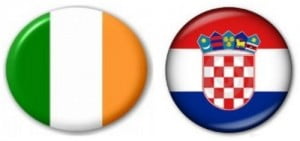Article: Croatia, Ireland & the EU
 Ireland’s entry into the EU – or as it was know then the EEC came at a very different juncture back in 1973 as it does for Croatia now. Europe had little int he way of a developed single market and one of the main reasons for joining was that the UK was our biggest trade partner. In fact very little fuss was made of joining as the EEC, as it was not much more than a loose association of states in a trade alliance. So in we went and most thought little of it and it was hardly surprising, as the reality was that it took more than twenty years of membership before the big benefits were felt on the ground.
Ireland’s entry into the EU – or as it was know then the EEC came at a very different juncture back in 1973 as it does for Croatia now. Europe had little int he way of a developed single market and one of the main reasons for joining was that the UK was our biggest trade partner. In fact very little fuss was made of joining as the EEC, as it was not much more than a loose association of states in a trade alliance. So in we went and most thought little of it and it was hardly surprising, as the reality was that it took more than twenty years of membership before the big benefits were felt on the ground.
Today sees Croatia facing into an uncertain future and joining what is effectively an unstable Europe. Who’s doing who a favor one might ask? Although Ireland’s entry in the early 70′s heralded little fanfare, the EC and then EU oft he late 90′s most certainly did. As the EU got itself in more of a sustainable and organized place, structural funding began to flow heavily into the Emerald isle. The EU paid for the vast majority of our national road network and much much more. The Irish became pretty skilled at getting EU grant funding, and at the time the member states had a far greater majority of „strong“ states. The underdeveloped countries were Ireland, Portugal and Greece. The France, Germany and the UK of the time didn’t skip a heartbeat in being able to cover our developmental needs.
So what now, does Croatia go in, and if so why? Well the upsides are still there – open markets, eventually the right to travel and work, a tightening on anti corruption, strengthening the rule of law and the ongoing possibility for still considerable investment from the mother ship although to date Croatia has only applied for a small fraction of the potential grants out there.
There are downsides too – The Irish and probably many others remember the fiasco of the straight bananas – where the EU decreed that to ensure the quality of this fruit being imported onto the market that it had to conform to a level of non-bendyness. God knows how much food stuff was needlessly destroyed in the pursuit of the straight banana but needless to say there were plenty of parts of the world who would have accepted good healthy bananas even if they were square. There is also the standardization of health and safety practices which in the area of local food production may well have an impact in Croatia. The EU will question whether “Baka” really knows how to make fresh cheese and whether Slavonians know how to slaughter a pig. Surely some level of testing will even come in for the production of olive oil, though Dalmatians and Istrians have been creating the best since time began.
But here’s the irony about home grown or home made products. In the 1980′s as Ireland stood stagnant, so much of our focus on what constituted „a better life“ was orientated on what America had achieved. So many Irish had left to find a better life there and stories flooded back of success in a land of opportunity. One can perhaps understand the feeling that what was local and Irish – was backwards. In many ways our national lack of self belief in our potential to be competitive compounded that. With this „all else is better than home“ view it was for example, easy for advertising to tell us that food which had travelled half way around the world to our door (potent with chemicals, which much of it still is now), was better. You couldn’t design a country better for growing fresh healthy produce. The effect was so pronounced that farming in Ireland in the 80′s collapsed. Ireland being a rural country and farming it’s industry, the politicians were cornered and begged that the industry be supported on grants rather than redevelop the industry and promoting people to buy Irish. By the time that the 90′s came around – the concept of growing any of your own food was absurd – unless you were a hippy.
But this is where it’s different in Croatia. Most people I know will take the not so pretty real fruit or vegetable, over the plastic packed equivalent – there is still hope for local production here along with the supermarket reality, because there is still a demand. But will these EU testing standards remove all this? It shouldn’t, not if we don’t let it by keeping the demand in place, and if it does it will be a huge loss, not only for our diets but for the many subsistence farmers and planters who bring these beautiful things to the local markets. Both these parts of the equation are needed, big and small producer and it is really up to us whether we allow small producers to be eradicated. Although Ireland lost some of these traditions and traditional industries because we didn’t value them at the time, fortunately many re-emerged over time as people reinvented themselves to survive, thrive and do what they knew best.
In Ireland big industry got hit as well in the 80′s. The ones we lost had become highly uncompetitive and many were semi state supported. The open market left no place to hide and then under anti competition laws Europe then removed the ability of a state to pump in money to keep them up. The writing was already on the wall as most hadn’t realized what a dangerous choice it is to continually support non-competitive business with tax payers money. These business don’t generate much or anything to GDP and on the other side the tax payer picks up the bill putting added stress on those companies that do function. Eventually both sides sink, and sink they did in Ireland. It was a brutally hard time and many said they didn’t see it coming. So will it really happen here? I think it will. Perhaps the better question is how might we respond?
The state employs about a third of people in Croatia directly or indirectly, this is a huge proportion based on the number of people working in general and the wage and tax levels. What’s missing here are more entrepreneurs. I have heard the claim that because of socialism that people lost their entrepreneurial spirit, and maybe that is true that people are reluctant to set up their own businesses. However on the other hand I have never know a place where so many people are negotiating day in day out for a service they provide or a product they sell. Granted a good deal of it is not wildly legal but is the entrepreneurial ability here – YES, in spades. I’ve never met such a resilient people in my life, who can survive int he most dire of situations. In more „stable“ countries in Europe because of employee rights they have almost returned to „a job for life“ concept where as here it is presently and honestly – an illusion.
The EU has good and bad, Croatia too. What seems to be happening is that Croatia is aligning with the least helpful of EU policies, while at the same time as we „modernize“ and become more „European“, we seem to be throwing away some of the best things about Croatia – such as work life balance, humanity in the work place and thinking seems to be growing that to be a leader, you must be without soul. The people of Croatia are too brilliant, to beautiful, too caring in general to let Europe just wash over us, for God’s sake this country produced Tesla and Gibonni, just to start!
Ireland did survive the big storm oft he 80′s and early 90′s and in the late part of the 90′s the economy started to grow and soon after exploded to a growth rate of around 8% for almost 10 years. That, as many know ended in a collapse and now the country is rebuilding again. In the simplest of terms, things have gone wrong when we lost who we were – when we believed that we were only good for the village in the 70′s and 80′s and in the boom and bust period of 1997 – 2007 when the Irish though they all lived in Monaco. It has been our ability to come back to reality that has helped us most – to know who we are, and how good we can be – individually and as a nation.
The European Union should consider themselves very lucky to have this amazing country as part of their club, and it is our place to say how this works – and how it works for us. The lessons of the past are there, so instead of „You must trust us“, perhaps it’s time we trusted ourselves.
Paul O’Grady 2012
